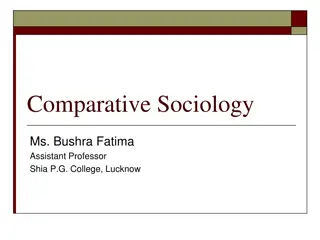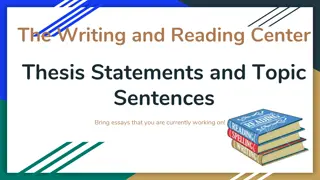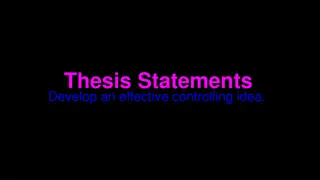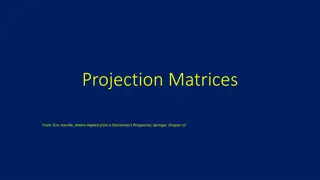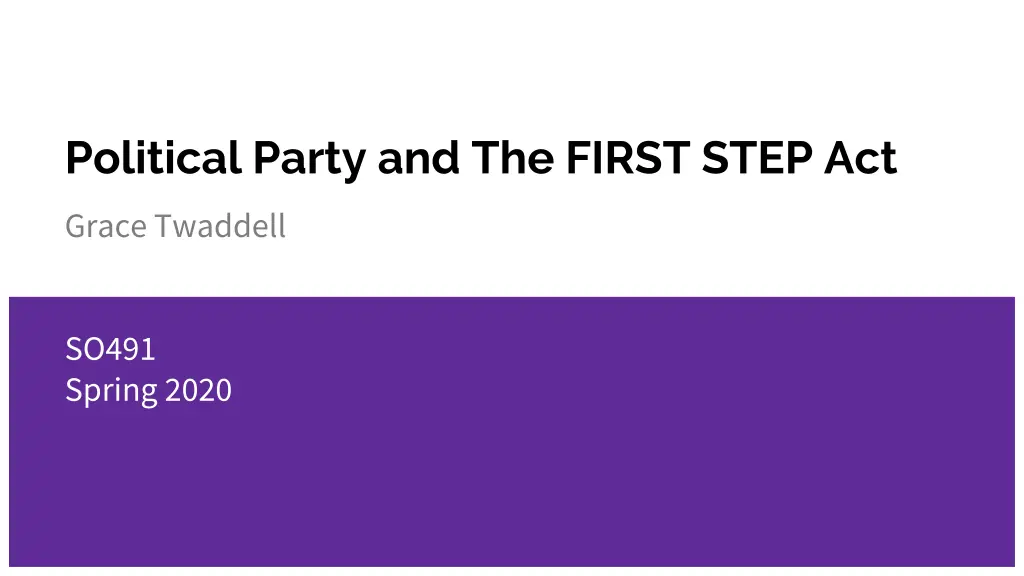
Political Party Influence on First Step Act Opinion
Explore how political alignment influences opinions on the First Step Act, a bipartisan criminal justice reform policy signed into law in 2018. The research project delves into the impact of political affiliation on perceptions of reintegration, rehabilitation programs, and sentencing reforms in the context of mass incarceration.
Download Presentation

Please find below an Image/Link to download the presentation.
The content on the website is provided AS IS for your information and personal use only. It may not be sold, licensed, or shared on other websites without obtaining consent from the author. If you encounter any issues during the download, it is possible that the publisher has removed the file from their server.
You are allowed to download the files provided on this website for personal or commercial use, subject to the condition that they are used lawfully. All files are the property of their respective owners.
The content on the website is provided AS IS for your information and personal use only. It may not be sold, licensed, or shared on other websites without obtaining consent from the author.
E N D
Presentation Transcript
Political Party and The FIRST STEP Act Grace Twaddell SO491 Spring 2020
Introduction Criminal justice reform has been a hot topic in politics. With rates of mass incarceration rising, many politicians are looking to see how policies can be adjusted to better protect the country. For my research project, I plan to study how political alignment affects an individual s opinion of the First Step Act. I am interested in studying this topic because the First Step Act was recently signed into law in 2018 by President Trump. At the time, it was praised for being a bipartisan policy and received lots of support from both sides of Congress.
How does an individuals political affiliation affect their opinion on the FIRST STEP Act? Research Question
Literature Review The FIRST STEP Act was written into law in 2018. The vote history shows that this was mainly a bipartisan effort (Cohen 2019). The main focus of the FIRST STEP Act is taking preliminary action to reintegrate persons who have completed their sentences (American Bar Association House of Delegates). This is done mainly through rehabilitation programs (Cohen 2019). Participation in these programs is encouraged and rewarded with earned good time credits. For every thirty days spent participating in the program, the inmate can earn ten days of good time credit . DeMint, et al. present the advantages and drawbacks of these incentives (2018).
Literature Review (Contd) These reforms to federal law may appear controversial to Republican politicians that still believe in the tough-on-crime approach that President Nixon began advocating for in his successful 1968 campaign (Cohen, 2018). Gallup Poll results show that, at the time, the tough on crime approach was popular among the general public, although not among Democrats, who had little choice but to go along with it (1992). The Violent Crime Control and Law Enforcement Act of 1994 was a result of this approach, and included clauses such as mandatory life sentences for repeat drug offenders. Sentencing components were revisited in the FIRST STEP Act.
Literature Review (Contd) The Anti-Drug Abuse Act of 1986 was signed during this Republican-led, tough-on-crime period, but also during a time that was particularly tough on drug crimes. The act increased penalties for various drug crimes, as well as including the controversial 100-to-1 disparity between powder cocaine and crack cocaine. (Cohen, 2019). President Obama passed the Fair Sentencing Act of 2010, which changed this ratio from 100-to-1 to 18-to-1 for all future sentencings (Cohen, 2019). The FIRST STEP Act of 2018 applies the Fair Sentencing Act of 2010 retroactively, meaning any federal inmate who was sentenced before 2010 could appeal their sentencing decision (Cohen, 2019).
Literature Review (Contd) The FIRST STEP Act of 2018 also expanded guidelines for sentence modifications. Inmates can file for a sentence reduction by judge now. Judges can reduce sentences if extraordinary and compelling reasons warrant such a reduction and that the person is not a danger to the safety of any other person or to the community (Russell, 2019). Another modification is the expansion of compassionate releases. Jefferson-Bullock discusses the ethics of compassionate release (2019).
Theory The First Step Act was passed in Senate by a vote of 87-12. Of the 12 dissenting votes, all representatives were Republican. It then passed in the House by a vote of 358-36. Of the 36 dissenting votes, all representatives were Republican. One reason Republicans may not have supported this act is because it applies President Obama s Fair Sentencing Act retroactively. Tough-on-crime Republicans felt that dangerous inmates might be moved to community confinement earlier than expected with the new changes (Cohen, 2019). Representatives for both the Senate and House of Representatives are elected every two years by citizens with registered addresses in the district they represent. These elected officials are tasked with representing the will of people in their district, including those who believe in the tough-on-crime approach. Therefore, we can expect them to vote in accordance with the people that make up their political party.
A person that aligns themselves with the Republican Party would be less approving of the First Step Act, and a person that aligns themselves with the Democratic Party would be more approving. Hypothesis
Methods Data Collection: Due to limited resources and restriction and Covid 19, I distributed my questionnaires virtually. Measurements: DV: On a scale of 1 (do not approve at all) -10 (approve very much), how do you feel about the First Step Act ? IV: On a scale of 1 (Fully Republican) -10 (Fully Democrat), how would you rank your political affiliation? Because not everyone is well informed in politics, the questionnaire gave a brief overview of the First Step Act. In order to eliminate potential confounding effect of a third variable, participants were asked questions regarding gender, age, race, and religion for statistical control. Statistical Model: Both my IV and DV are treated as continuous variables. Two OLS regression equations were estimated to test the hypothesis. The hypothesis will be supported if the coefficient for Party affiliation is positive and significant.
Data Analysis Results r=0.291 indicates there is a moderate, positive correlation between political affiliation and approval of the FIRST STEP Act. R2= 0.085 indicates that 8.5% of the total variance in approval of the FIRST STEP Act can be attributed to political affiliation.
Conclusion Data analysis shows that there is a moderate and positive correlation between Political Party and Approval of the FIRST STEP Act. The coefficient for Political Party is positive and statistically significant. This result supports that hypothesis that a person that aligns themselves with the Republican Party would be less approving of the First Step Act, and a person that aligns themselves with the Democratic Party would be more approving The control variables I selected also did not present a strong correlation. Future studies should look at the effect of education, gender, race, and religion on approval of the act.
References American Bar Association House of Delegates. (2019). Perspectives on the First Step Act: Resolution 101 and Report on the First Step Act. Federal Sentencing Reporter, 32(2), 106-108. https://doi.org/10.1525/fsr.2019.32.2.106 Cohen, D. (2019). Justice, Not Jailbreak: The Context and Consequences of the First Step Act. Victims & Offenders, 14(8), 1084-1098. https://doi.org/10.1080/15564886.2019.1671287 DeMint, J., Huckabee, M., Chaffetz, J., Ehrlich, B., Molden, M., Brandon, A., DeRoche, C., Daniels, D., Chapman, T., Safavian, D., Nolan, P., Malcolm, J., DeRoche, C., Norquist, G. , Gardner, B., Blackwell, K., Cohen, D., Kerik, B., Madden, J., Robers, K. (2018). Conservative Leaders Letter to President Trump Expressing Support for FIRST STEP Act. Federal Sentencing Reporter, 31(2), 160-167. https://doi.org/10.1525/fsr.2018.31.2.160 FIRST STEP Act of 2018. S. 756 (115th Congress). https://www.congress.gov/bill/115th-congress/senate-bill/756 Hudson, C. (2014). Between a Rock and a Hard Place: Ensuring that Defendants Incorrectly Sentenced Between the Fair Sentencing Act of 2010 and United States v. Dorsey Achieve Re-Sentencing. Columbia Journal of Law & Social Problems, 48(1), 141-179. Jefferson-Bullock, J. (2019). Perspectives on the First Step Act: Consensus, Compassion, and Compromise? The First Step Act and Aging Out of Crime. Federal Sentencing Reporter, 32(2), 70-75. https://doi.org/10.1525/fsr.2019.32.2.70 Russell, S. (2019). Perspectives on the First Step Act: Second Looks at Sentences under the First Step Act. Federal Sentencing Reporter, 32(2), 76-85. https://doi.org/10.1525/fsr.2019.32.2.76

